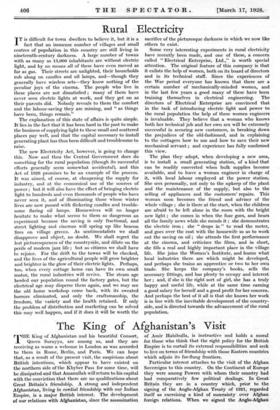Rural Electricity
IT is difficult for town dwellers to believe it, but it is a fact that an immense number of villages and small centres of population in this country are still living in nineteenth-century darkness. A large number of towns with as many as 15,000 inhabitants are without electric light, and by no means all of these have even moved as far as gas. Their streets are unlighted, their households rub along on candles and oil lamps, and—though they generally have wireless sets—they know nothing of the peculiar joys of the cinema. The people who live in these places are not dissatisfied ; many of them have never seen electric lights at work, and they get on as their parents did. Nobody reveals to them the comfort and the labour-saving they are missing, and "as things have been, things remain."
The explanation of this state of affairs is quite simple. It lies in the fact that it has been hard in the past to make the business of supplying light to these small and scattered places pay well, and that the capital necessary to install generating plant has thus been difficult and troublesome to raise.
The new Electricity Act, however, is going to change this. Now and then the Central Government does do something for the rural population (though its successful efforts generally seem somewhat accidental), and this Act of 1926 promises to be an example of the process. It was aimed, of course, at cheapening the supply for industry, and at the economical use of the sources of power ; but it will also have the effect of bringing electric light to hundreds and even thousands of people who have never seen it, and of illuminating those whose winter lives are now passed with flickering candles and trouble- some flaring oil lamps. Housewives will no longer hesitate to make what seems to them so dangerous an experiment because the saving is only fractional, and street lighting and cinemas will spring up like beacon fires on village greens. As sentimentalists we shall disapprove and object, no doubt. We shall regret the lost picturesqueness of the countryside, and dilate on the perils of modern jazz life ; but as citizens we shall have to rejoice. For the drift to the towns will be checked, and the lives of the agricultural people will grow brighter and brighter in the glow of their electric lights. Perhaps, too, when every cottage home can have its own small motor, the rural industries will revive. The steam age herded our population round the factory gates, but the electrical age may disperse them again, and we may see the old home workshop come back, with its sweated horrors eliminated, and only the craftsmanship, the freedom, the variety and the health retained. If only the problem of distribution and marketing can be solved this may well happen, and' if it does it will be worth the sacrifice of the picturesque darkness in which we now like others to exist.
Some very interesting experiments in rural electricity have recently been made, and one of these, a concern called "Electrical Enterprise, Ltd.," is worth special attention. The original feature of this company is that it enlists the help of women, both on its board of directors and in its technical staff. Since the experiences of the War period everyone has known that there are a certain number of mechanically-minded women, and in the last few years a good many of these have been training themselves in electrical engineering. The directors of Electrical Enterprise are convinced that in the task of introducing electric light and power to the rural population the help of these women engineers is invaluable. They believe that a woman who knows both her technical job and her own sex will be extremely successful in securing new customers, in breaking down the prejudices of the old-fashioned, and in explaining to the cottagers how to use and how to save their new mechanical servant ; and experience has fully confirmed this view.
The plan they adopt; when developing a new area, is to install a small generating station, of a kind that can be readily converted when bulk supplies become available, and to leave a woman engineer in charge of it, with local labour employed at the power station. She sees personally, not Only to the upkeep of the plant and the maintenance of the supply, but also to the selling of appliances and 'the customers' repairs. This woman soon becomes the friend and adviser of the whole village ; she is there at the start, when the children are afraid to be left alone in the room with the bright new light ; she comes in when the fuse goes, and hears all the family news while she mends it ; she demonstrates the electric iron ; she "drops in" to read the meter, and goes over the cost with the housewife so as to work out the saving on oil ; she attends the first performance at the cinema, and criticizes the films, and in short, she fills a real and highly important place in the village life. She joins the Women's Institute, and learns what local industries there are which might be developed, and perhaps she trains an apprentice or two to her own trade. She keeps the company's books, sells the necessary fittings, and has plenty to occupy and interest her ; and, if she is the right sort of girl, she has a truly happy and useful life, while at the same time earning a good salary for herself and a good profit for her concern. And perhaps the best of it all is that she knows her work is in line with the inevitable development of the country- side, and is directed towards the advancement of the rural population.










































 Previous page
Previous page